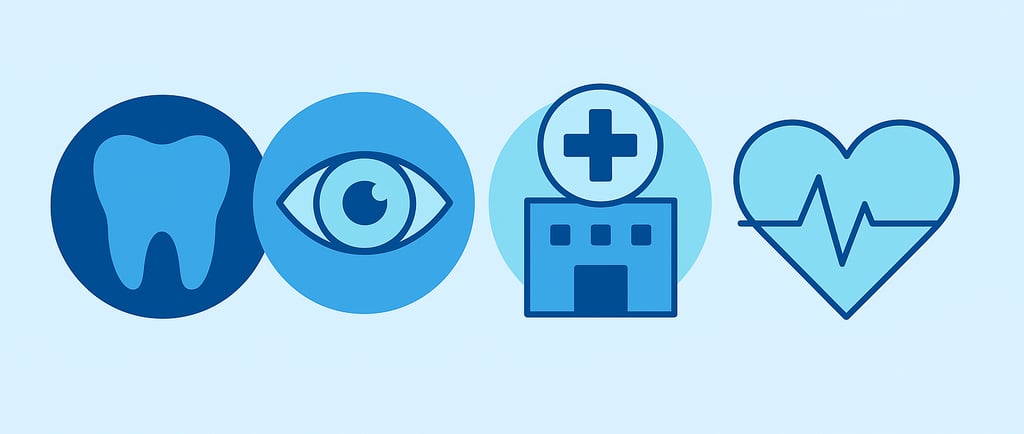The Complete Guide to Supplemental Insurance: Dental, Vision, Disability & More
Understand the top supplemental insurance options, what they cover, and why adding them to your health plan saves money and provides peace of mind.
Trevor Evans
9/22/20252 min read


Understanding Supplemental Insurance: Filling the Gaps in Coverage
Health insurance is a great foundation, but it often doesn’t cover every need. That’s where supplemental insurance products come in. These plans are designed to fill the gaps, reduce your out-of-pocket costs, and protect your income when life throws the unexpected your way.
Let’s break down some of the most common supplemental products and why they matter.
1. Dental Insurance
Dental health is often overlooked until a problem arises—and dental care can be expensive. From regular cleanings to root canals, costs can quickly add up.
What it covers:
Preventive care like cleanings, exams, and x-rays
Basic procedures such as fillings and extractions
Major services like crowns, dentures, and root canals
Why it matters: Routine dental care not only saves money long-term but also prevents larger health issues connected to poor oral health.
2. Vision Insurance
Eye health is just as important as dental, but most health plans don’t cover it.
What it covers:
Eye exams
Glasses and contact lenses
Discounts on LASIK or corrective surgeries (in some plans)
Why it matters: Vision insurance is affordable and ensures you’re not paying hundreds out of pocket for glasses or contacts every year.
3. Indemnity Plans
Also known as fixed benefit plans, these pay you a set cash amount when you experience a covered event, regardless of what your medical bill actually costs.
Examples:
$100 for a doctor’s office visit
$1,000 for a hospital stay
Why it matters: Cash payouts give you flexibility. You can use the money for medical bills, transportation, childcare, or anything else you need.
4. Critical Care Insurance
Critical illness plans provide a lump-sum payment if you’re diagnosed with a serious condition such as cancer, heart attack, or stroke.
What it covers:
Major life-threatening illnesses outlined in the policy
Cash benefit can be used however you choose
Why it matters: A diagnosis often comes with both medical bills and lost income. Critical care insurance gives you financial breathing room during recovery.
5. Long-Term Disability Insurance
If you’re unable to work due to illness or injury, long-term disability insurance replaces a portion of your income.
What it covers:
Typically 50–70% of your paycheck, depending on the plan
Coverage for extended periods (months or even years)
Why it matters: Your most valuable asset is your income. Disability insurance ensures you can pay your bills and support your family even if you can’t work.
6. Hospital Indemnity Plans
Hospital stays are expensive—even with health insurance. These plans provide cash benefits for hospital admission, daily confinement, ICU stays, and more.
Why it matters: They help offset high deductibles, copays, and coinsurance by giving you extra financial support during hospitalizations.
7. Other Supplemental Options
Accident Insurance: Pays benefits for injuries caused by accidents (broken bones, ER visits, ambulance rides).
Cancer Insurance: Specific coverage for cancer treatment costs not covered by traditional insurance.
Short-Term Disability: Provides income protection for shorter recovery periods, like after surgery or childbirth.
Why Supplemental Insurance Is Worth It
Even the best health insurance leaves gaps. Supplemental products are designed to:
Lower out-of-pocket costs
Provide cash flexibility during tough times
Protect your savings and income
Give peace of mind knowing you’re covered for more than just the basics
✅ Bottom line: Supplemental insurance isn’t “extra” – it’s essential protection that ensures you and your family aren’t financially blindsided by life’s surprises.
Tailored To You Insurance
Come Follow Us on Social Media!
Contact
Support
© 2025 Tailored To You Insurance | Serving Palm Beach, Lake Worth & 40+ States | Privacy Policy | Terms of Service
